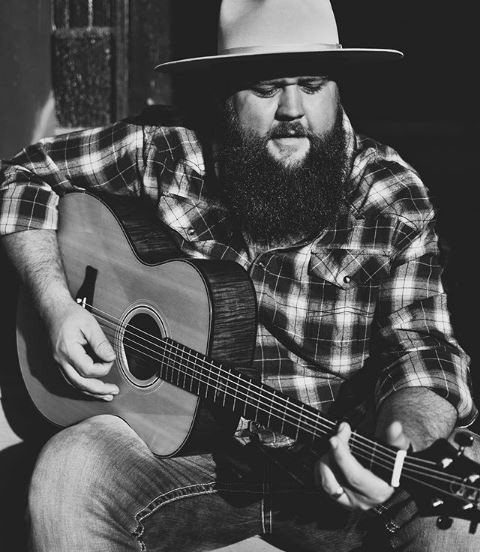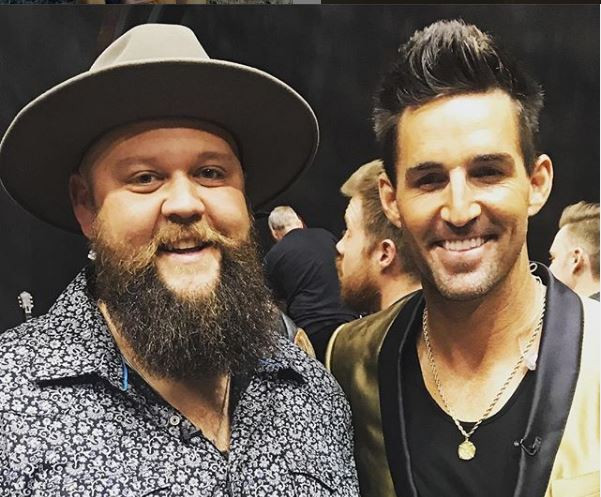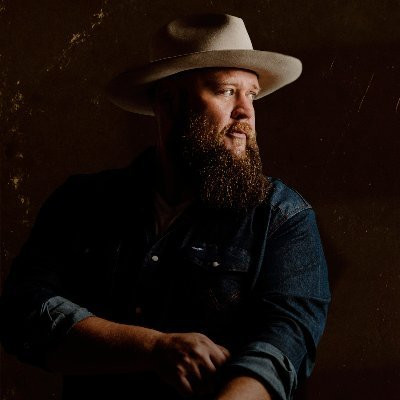When I first heard “Where I Find God” on the radio, I was immediately captivated. The raw emotion and genuine lyrics of the song resonated deeply, prompting me to listen to it repeatedly. Like many, I was new to the music of Larry Fleet but intrigued by the authenticity in his voice and songwriting. Learning he had ties to Chattanooga piqued my curiosity even further, leading me to delve deeper into the story behind this compelling artist and his growing catalog of Larry Fleet Songs.
While Larry Fleet isn’t originally from Chattanooga, he currently calls it home with his wife and son, Waylon. His roots trace back to White Bluff in Dickson County, just west of Nashville. Despite being close to Music City, his path to country music success was far from straightforward.
Fleet’s musical heritage stems from his great grandfather and great uncle, who formed a gospel and bluegrass band called The Happy Two. Though they held regular jobs, their passion for music led them to local radio stations to perform live. This early exposure to music within his family laid the foundation for Larry’s own musical journey.

Larry’s formal music education began with his Great Uncle Jim, who taught him guitar by ear. Although his great-grandfather was no longer able to play, the tradition of music in the family continued. Family gatherings often revolved around music at Uncle Jim’s house, where young Larry was eager to participate. At the age of five or six, his uncle introduced him to chords and quickly taught him to play “Wildwood Flower,” a song popularized by the Carter Family. From that point on, Larry honed his skills by ear, later complementing his natural talent with formal lessons and music reading.
His initial musical explorations were in bluegrass, a genre known for its technical complexity. Mastering bluegrass at a young age provided him with a strong foundation that made learning other musical styles easier. Fleet even performed at the legendary Ryman Auditorium with a group of kids when he was around seven years old. He reflects, “At seven-years-old, you really don’t know what the Ryman Auditorium is, but now I know and I finally got to go back and play it again before COVID.” This early experience on such a prestigious stage foreshadowed his future in music.
At 22, Fleet secured his first publishing deal, navigating the competitive landscape of Nashville like countless others. While some prominent artists placed holds on his songs, none were ever recorded, and financial success remained elusive. He even spent time working at WSM, the iconic home of the Grand Ole’ Opry. Songwriting remained his primary focus, but his vocal and instrumental talents allowed him to perform at various festivals and bars in Nashville and Chattanooga.
Despite his lifelong proximity to country music, a breakthrough seemed distant. With his wife having established a career in Chattanooga, Larry made the move to East Tennessee. He transitioned to construction work when music prospects in Nashville appeared stagnant.
He found stability and contentment in construction. However, the call of music was still strong. He formed a small three-piece band in Chattanooga, performing on weekends. “We got back to our roots and enjoyed playing music,” he explains, finding joy in the simple act of making music again.

A pivotal moment occurred when he played a private event outside of Nashville. Country music star Jake Owen was present and recognized Fleet’s exceptional talent. Owen remarked, “You are too good to be playing over here in a bar to ten or twenty people.” Fleet explained his construction job and music as a hobby.
Owen countered that Fleet was wasting his talent in construction. Fleet recounted his response, “I’ve tried this for ten years and it didn’t work for me, so this is the way it is.”
Owen firmly replied, “I think you are an idiot to be throwing away a talent like this.”
In a bold move, Fleet challenged Owen, “If you take me on the road with you, maybe I’ll think about quitting my job.”
Owen agreed, and Fleet embarked on tours in Florida and Michigan, ultimately leading him to leave his construction career behind.
Since then, he has shared stages with notable artists like Jon Pardi and Willie Nelson, and joined Jake Owen on the Down to the Tiki Tonk Tour. A review in the Green Bay Press-Gazette highlighted Fleet’s immediate impact on audiences, noting that he “instantly impressed a crowd that chanted his name throughout the night.” This marked a significant turning point in his musical journey.

Fleet acknowledges that his path was unconventional: “My story is a little different because I moved away and that’s when it happened. Getting out of Nashville and really figuring out what I wanted to do, that’s when it really happened for me.” Stepping away from the intense pressure of Nashville allowed him to rediscover his musical purpose.
He expresses gratitude for Jake Owen’s unwavering support: “Jake has always been a big supporter of mine and a good friend and we are still real tight. We talk all the time and write songs together. We are signed on the same record label and he took me under his wing and he has been good to me. He gave me his word on something and he stuck to it.” This mentorship has been crucial to his ascent in the country music scene.
Fleet also credits his wife’s encouragement and support during the uncertain early stages of his career transition. Leaving a stable job to pursue music is a daunting prospect. He recalls her saying, “If Jake is on board and he thinks you are good enough, you should go for it.” During the initial year with minimal income, her support was instrumental in enabling him to tour and pursue his passion. “[That first year] I didn’t make hardly any money and she really picked up the slack for me to be able to [travel].”
He reflects on the challenges of the music industry: “It’s tough. A lot of people think that you move to Nashville and that you play at Tootsies one night and you are going to get a big record deal. Even if you get a record deal, you have to work hard to keep that record deal. To get on the radio is hard and to stay on it is even harder. Whenever you step up to another level, it’s harder to stay there.” Sustaining success in country music demands persistent effort and resilience.
Even moderate success doesn’t guarantee financial security due to high overhead costs. Fleet and his band were experiencing positive momentum when the COVID-19 pandemic brought live music to a standstill. While songwriting and radio airplay provided some income, it wasn’t sufficient to support his band.
He shares the realities faced by his band members: “My drummer is working at U-Haul and my bass player is working construction. Everyone is doing side jobs just to get by until we can get back on the road. It’s a weird business. You got to be a little bit crazy to want this. But if it’s in you, you do whatever it takes to keep going.” This illustrates the precarious nature of a career in music and the dedication required to persevere.
“Where I Find God” followed his Big Loud Records debut, Workin’ Hard, released in November 2019. “Workin’ Hard,” like his current hit, deeply resonates with the working class. These Larry Fleet songs capture the experiences and emotions of everyday life, contributing to his growing fanbase.
“Where I Find God” was co-written with Connie Harington, who also co-wrote award-winning hits like “I Drive Your Truck” for Lee Brice and “Mine Would Be You” for Blake Shelton. Fleet recognized the song’s potential early on: “I knew there was something special about this song.” Released on Good Friday, it quickly gained traction, amassing a million views within its first week.
Sirius XM’s The Highway initially featured it on their weekend show, “On the Horizon.” Fan acclaim propelled it into regular rotation. Host Storme Warran praised the song, stating, “This is one of the best songs we’ve had in years. It gets people’s attention because people live this song every day.” The relatability of Larry Fleet songs is a key factor in their widespread appeal.
Currently, “Where I find God” continues its climb on Sirius XM’s The Highway charts. With lyrics like From a bar stool to that Evinrude / Sunday mornin’ in a church pew / In a deer stand or a hay field / An interstate back to Nashville / In a Chevrolet with the windows down / Me and Him just ridin’ around / Sometimes, whether I’m lookin’ for Him or not / That’s where I find God, the song’s universal themes of faith and finding the divine in everyday moments deeply connect with listeners. This song is a prime example of how Larry Fleet songs tap into the heart of human experience.
Despite signing with Big Loud Records, Fleet has chosen to remain in Chattanooga, commuting to Nashville once or twice a week for songwriting and meetings. He currently has no plans to relocate back to Nashville, finding a balance between his music career and personal life in Chattanooga.
Larry Fleet’s musical style evokes comparisons to a young Chris Stapleton. His bluegrass background, innate songwriting talent, and authentic vocals position him to captivate a broad spectrum of music enthusiasts. His ability to blend traditional country roots with modern sensibilities makes Larry Fleet songs stand out in today’s country landscape.
In the meantime, immerse yourself in the world of Larry Fleet songs by listening to “Where I Find God.” Its compelling melody and honest lyrics are sure to resonate. Explore further on Fleet’s YouTube channel, discovering tracks like “Workin’ Man,” “Mix ‘Em With Whiskey,” “Lied About Love,” and many more singles and covers. Like many others, you might just find Larry Fleet to be your new favorite country singer, drawn in by the heartfelt honesty of his music and the relatable narratives within Larry Fleet songs.
Stay connected with Larry Fleet through his social media channels: Twitter, Facebook, Instagram, and YouTube.
Bethany Bowman is a freelance entertainment writer. Discover more of her work on her blog, Instagram, Twitter, and YouTube.
